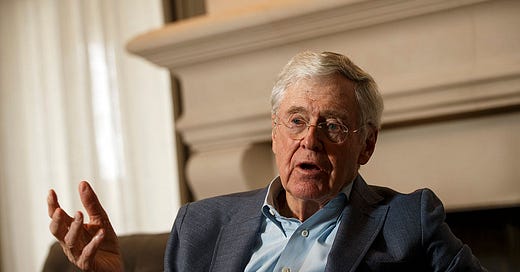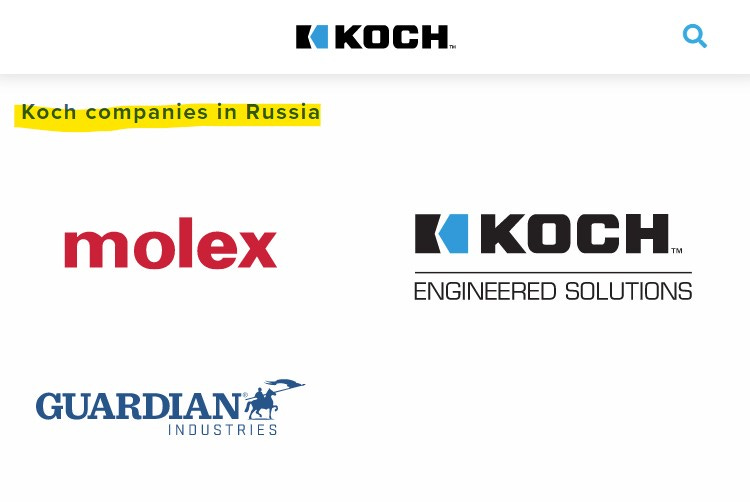Koch Industries, the conglomerate run by right-wing billionaire Charles Koch, has numerous ongoing business operations in Russia. Since Russia's invasion of Ukraine, Koch Industries has given no indications that those business operations have been suspended. On the contrary, the limited public comments made by Koch subsidiaries operating in Russia indicate that their business activities have continued.
Guardian Industries, for example, is a wholly-owned subsidiary of Koch Industries, acquired in 2017. Guardian, a manufacturer of industrial glass and other products, is based in Auburn Hills, Michigan but has production facilities around the world.
Guardian has two glass production plants that operate in Russia. One facility is in Ryazan, Russia, about 120 miles southeast of Moscow. The company added "a new jumbo laminated glass production line" to that facility in August 2021. Another facility is located in Rostov, Russia, near the border with Ukraine. The Rostov plant, which began operations about a decade ago, cost $220 million to build and produces "Guardian’s high-performance, energy-efficient ClimaGuard(R) (residential) and SunGuard(R) (commercial) glass products for construction of homes, offices, retail, health-care and other facilities." It is capable of producing "900 tons of glass per day."
"Guardian is bullish on Russia given the excellent growth at our first plant in Ryazan and the customers we have in the country. The timing is right for the region and for Guardian," the company said in 2011, shortly before the Rostov plant opened.
Earlier this month, a Guardian spokesperson indicated its employees are continuing to work at its Russian facilities after the invasion of Ukraine. Alexandra Birladianu, head of corporate communication at Guardian, provided this statement to USGlass Magazine on March 4:
Guardian Industries continues to closely monitor the tumultuous events in Eastern Europe, supporting our employees who are affected. The health and safety of our employees and all personnel working at our facilities is our first priority
Popular Information contacted Guardian, both directly and through Koch Industries, and requested comment on its operations in Russia. The company did not respond.
Guardian is one of three Koch Industries subsidiaries with operations in Russia, according to the Koch Industries corporate website:
Hundreds of international companies have suspended their operations in Russia, seeking to pressure Putin to end his assault on Ukraine through economic isolation. Koch Industries has apparently taken a different course.
The Russian operations of Koch subsidiary Molex
Molex is an electronic components manufacturer that was acquired by Koch Industries in 2013. Molex offers its products through a network of third-party distributors across Russia and offers a version of its corporate website in Russian.
It has posted two letters regarding "business continuity" in Eastern Europe. The first letter, posted February 25, 2022, says the company is "monitoring the ongoing developments between Russia and Ukraine." It says that the company is "actively monitoring our existing land, sea and air carriers with routes traversing Ukraine and Russia." Further, "route adjustments have been initiated to mitigate product disruptions between Molex and our customers."
The second letter, posted March 1, 2022, is identical except "ongoing developments between Russia and Ukraine" has been changed to "ongoing developments in Eastern Europe." The words "Russia and Ukraine" were also removed from the header of the letter.
Popular Information contacted Molex, both directly and through Koch Industries, and requested comment on its operations in Russia. The company did not respond.
The Russian operations of Koch Engineered Solutions
Koch-Glitsch, one of a series of affiliated companies that operate as Koch Engineered Solutions, provides industrial products for the "chemical, petrochemical, refining, gas processing, pharmaceutical and specialty chemical industries." The company maintains a sales office in Moscow.
The company has a history of using creative practices to evade sanctions. When the U.S. government banned "American companies from selling materials to Iran," Koch-Glitsch used subsidiaries in Germany and Italy to continue selling its products. Those sales continued until 2007. “Every single chance they had to do business with Iran, or anyone else, they did,” George Bentu, a former sales engineer for Koch-Glitsch, told Bloomberg News in 2011. The sales "may not have violated the law if no U.S. people or company divisions facilitated trades with Iran."
Neither Koch-Glitsch or Koch Engineered Solutions has publicly commented on the Russian attack on Ukraine. Several requests for comment by Popular Information were not returned.
Does Charles Koch care about Russian human rights violations?
Charles Koch's alleged indifference to Russian human rights violations sparked a controversy at the Atlantic Council, an elite think tank based in Washington, DC.
The trouble started when two Atlantic Council experts, Emma Ashford and Mathew Burrows, wrote an article arguing that "the U.S. should not focus on human rights in its dealings with Russia." The piece argued that the U.S. should not have imposed sanctions on Russia in response to the Kremlin's poisoning and attempted assassination of opposition figure Alexei Navalny.
More than 20 Atlantic Council staffers published a response criticizing the piece as misguided. One of the signatories told Politico that "they worried the article was… influenced by a $4.5 million donation over five years to the Atlantic Council from Charles Koch." Not long after the donation, Ashford joined the Atlantic Council from "the Koch-funded libertarian think tank the Cato Institute."
The signatory, who was not identified, said that the "Koch industry operates as a Trojan horse operation trying to destroy good institutions and they have pretty much the same views as the Russians." Other Atlantic Council staffers claimed Ashford and Burrows "were only hired because of the Koch money that the Atlantic Council received." Fred Kempe, CEO of the Atlantic Council, called the allegation "outrageous."
Today, numerous Koch subsidiaries continue to do business with Russia as its military increasingly targets civilians in Ukraine.
Dan Caldwell, senior vice president for foreign policy at Stand Together, a group founded and funded by Charles Koch, has expressed skepticism about the actions taken by the United States — including sanctions and military assistance, to counter Russian aggression. On Twitter, Caldwell has suggested the United States should stop supporting Ukraine (by declaring "neutrality") and described sanctions as misguided.
"I am extremely concerned that some of these policies being pushed from policymakers on both sides of the aisle will put us on a path toward a conflict with a nuclear-armed Russia," Caldwell told the New York Times.







Heh, they are just following a family tradition. Koch built oil refineries in Russia in the 20's and 30's and for Nazi Germany built refineries that made airplane fuel. (Their late 30's slogan was, "The Battle of Britian - partially brought to you by Koch Industries.")
Great report, Judd!